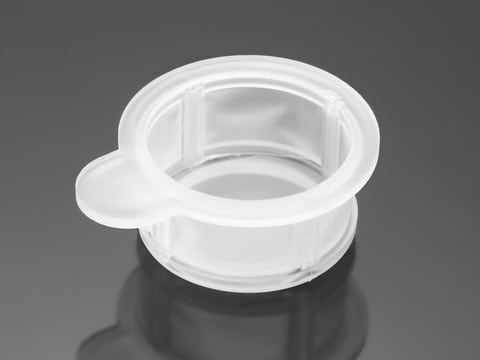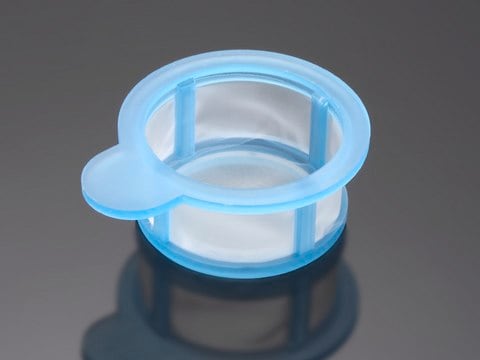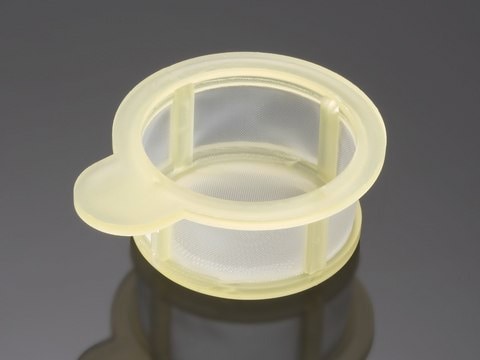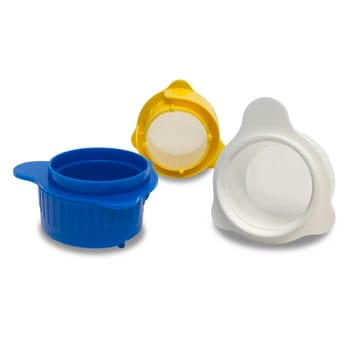CLS431751
Corning® cell strainer
pore size 70 μm, white, sterile, pkg of (individually wrapped), pack of 50 ea, Corning 431751
Synonyme(s) :
Cell Strainer
Se connecterpour consulter vos tarifs contractuels et ceux de votre entreprise/organisme
About This Item
Code UNSPSC :
41104913
Nomenclature NACRES :
NB.24
Produits recommandés
Matériaux
Nylon
white
Stérilité
sterile
Conditionnement
pack of 50 ea
pkg of (individually wrapped)
Fabricant/nom de marque
Corning 431751
Dimension de pores
70 μm
Vous recherchez des produits similaires ? Visite Guide de comparaison des produits
Description générale
Corning® 70μm Cell Strainer is a sterile, easy-to-use device for rapidly isolating primary cells to consistently obtain a uniform single-cell suspension from tissues.
Application
Corning® 70μm Cell Strainer is a faster, easier alternative to gauze filtration. It is ideal for preparation of flow cytometry samples, including:
- Single cell suspensions of blood cells from marrow, pancreas, thymus, tonsil, and lymph nodes
- Stem cells, tissue-derived cells, and cancer cells
- Preparation of specimens for primary cell cultures and immunogens
- Preparation of freezing stocks
- Filtering agglutinative proteins produced in inactivation serum
Caractéristiques et avantages
- Strong nylon mesh with 70- micron pores for optimal performance in a variety of applications
- Evenly spaced mesh pores providing consistent and reliable results
- Conveniently accessible in individual packaging
- Extended lip on strainer enables aseptic handling with forceps
- Molded color-coded polypropylene frame with tab enables easy handling and identification
- Fits all major brands of 50mL conical tubes
- Disposable, easy-to-use, inexpensive, maintains sample integrity
- Sterilized by γ−irradiation, noncytotoxic
Informations légales
Corning is a registered trademark of Corning, Inc.
Certificats d'analyse (COA)
Recherchez un Certificats d'analyse (COA) en saisissant le numéro de lot du produit. Les numéros de lot figurent sur l'étiquette du produit après les mots "Lot" ou "Batch".
Déjà en possession de ce produit ?
Retrouvez la documentation relative aux produits que vous avez récemment achetés dans la Bibliothèque de documents.
Les clients ont également consulté
Josefine Tratwal et al.
Frontiers in endocrinology, 11, 480-480 (2020-10-20)
The bone marrow (BM) exists heterogeneously as hematopoietic/red or adipocytic/yellow marrow depending on skeletal location, age, and physiological condition. Mouse models and patients undergoing radio/chemotherapy or suffering acute BM failure endure rapid adipocytic conversion of the marrow microenvironment, the so-called
Kelly C Santos Roballo et al.
Biomaterials, 209, 1-9 (2019-04-26)
Segmental injuries to peripheral nerves (PNs) too often result in lifelong disability or pain syndromes due to a lack of restorative treatment options. For injuries beyond a critical size, a bridging device must be inserted to direct regeneration. PN allografts
Lamba Omar Sangaré et al.
Cell host & microbe, 26(4), 478-492 (2019-10-11)
Toxoplasma can reach distant organs, especially the brain, leading to a lifelong chronic phase. However, genes involved in related in vivo processes are currently unknown. Here, we use focused CRISPR libraries to identify Toxoplasma genes that affect in vivo fitness. We focus
José A Jiménez-Torres et al.
EBioMedicine, 42, 408-419 (2019-03-25)
Anti-angiogenic treatment failure is often attributed to drug resistance, unsuccessful drug delivery, and tumor heterogeneity. Recent studies have speculated that anti-angiogenic treatments may fail due to characteristics inherent to tumor-associated blood vessels. Tumor-associated blood vessels are phenotypically different from their
Joanna Kalucka et al.
Cell, 180(4), 764-779 (2020-02-16)
The heterogeneity of endothelial cells (ECs) across tissues remains incompletely inventoried. We constructed an atlas of >32,000 single-EC transcriptomes from 11 mouse tissues and identified 78 EC subclusters, including Aqp7+ intestinal capillaries and angiogenic ECs in healthy tissues. ECs from
Notre équipe de scientifiques dispose d'une expérience dans tous les secteurs de la recherche, notamment en sciences de la vie, science des matériaux, synthèse chimique, chromatographie, analyse et dans de nombreux autres domaines..
Contacter notre Service technique










